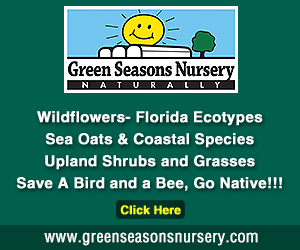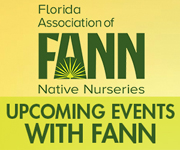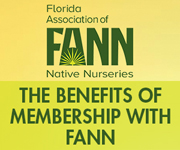On rare occasions, the townsfolk of Amherst, Massachusetts, would catch a glimpse of a ghostly figure dressed in white, leaning over to tend her flowers by flickering lantern light. The mysterious recluse, who was better known to neighbors for her exquisite garden than for her lyric poems that revealed a passionate love of nature, differed from fellow 19th-century American writers whose thinking became the bedrock of modern environmentalism. While Thoreau famously declared wild places to be "the preservation of the world," Emily Dickinson was finding nature’s truth and power in an ordinary dandelion.
|
FANN is hosting the second workshop in the GrowNative! education series for nursery growers on Friday, April 29, 2016 at Green Isle Gardens Nursery in Groveland, Lake County. Nursery owner Marc Godts will review butterfly and pollinator-friendly production methods and cultivation of native ecotype Milkweed (Asclepias spp.) without the use of pesticides. Marc is serving as FANN’s lead on native Milkweed production and has been distributing regionally appropriate Milkweed seed to FANN growers as part of the Florida Milkweed Project. Marc will also review cultivation practices for growing upland plants (e.g., sandhill, xeric flatwoods) in nursery conditions.
|
For these embattled environments, a tactic of eradication--killing all of the invasives—has proven to be the most effective course of action. Some people view this negatively. Killing potentially large numbers of animals seems counterintuitive to conservation. But more and more evidence has shown that removal of invasive species from threatened ecosystems is not only effective at restoring endangered habitats and species, but necessary.
|
FANN members, particularly those engaged in the restoration end of our industry, may want to consider putting themselves and their firms in front of the Florida Association of Environmental Professionals (FAEP) to build awareness of your expertise and offerings in the professional environmental community and also strengthen relationships with consultants, agencies and municipal staff. FAEP is a multidisciplinary professional association of environmental professionals from a variety of disciplines including biologists, scientists, geologists, environmental engineers, environmental attorneys, wetland scientists, botanists, planners, and many others that perform environmental work.
|


Florida beekeepers have said for years that the class of pesticides known as neonicotinoids are a major factor in bee colony losses, including losses attributed to colony collapse disorder Now they’ve gained a friend as Ortho, the nation’s leading brand of insect control products for lawn and garden use, said Tuesday it would immediately begin to transition away from neonicotinoids for outdoor use.
|

Michael Mingea, 67, died Sunday, April 10. Many FANN members will remember Mike from Green Images Nursery & Landscape in Christmas and Mike’s many years of service with the Florida Native Plant Society, Tarflower and Cuplet Fern Chapters, as well as a brief stint as FNPS Executive Director. Mingea was much beloved in Central Florida as a champion for tree canopy and native vegetation. A celebration of life will be held Saturday, April 23 at DeGusipe Funeral Home, 9001 N. Orlando Avenue, Maitland, FL 32751. Visitation begins at 11 a.m. with a service at noon, followed by a reception with food and beverages at the funeral home. If you would like to speak at the service, please contact Shari King at 407-496-2188. Thanks to Cuplet Fern Chapter FNPS and Tarflower Chapter FNPS for much of this information.
|
March 31-April 1, 2016 at Osceola Heritage Park, Kissimmee 218 registered attendees + ~ 74 staff members from 36 exhibitors + ~16 volunteer fans of FANN
|
FANN is delighted to welcome several new member companies, including one grower, one restoration firm and several landscape professionals, many of whom joined at or in conjunction with our 4th Annual Native Plant Show.
|
| |
 |
| |
|
Congratulations to Berni Volkmann in West Bradenton — Berni will be the recipient of a transformed landscape designed and planted by FANN as part of our sponsorship of How to Do Florida‘s Season 7 Special Edition "How to to do a Florida Yard" TV episode airing statewide this fall on the Fox Sports Sun Network, "Discover Florida" ROKU channel and select broadcast stations and in-flight video. Thanks to producer Chad Crawford and team for bringing this opportunity to us. In just one day, we’ll rip out Berni’s dulls-ville turf-intensive landscape and put in plants with a purpose! Natives and some edibles and another little surprise to enjoy it all the better ... FANN is thrilled to sponsor this show featuring the use of native plants and wildflowers in a landscape that saves water, cuts down on unnecessary fertilizer and pesticide, and brings joy to the homeowner. We’ll be on the show with our partner, Florida Wildflower Foundation, who is also sponsoring, and our supporting cast of FANN members.
|
2016 is FANN’s 30th anniversary year! FANN President Terry Godts made sure that Native Plant Show attendees had a chance to meet some of our founding members and hear how this intrepid group of native plant pioneers started the nation’s first association of native plant growers. Terry presented a visual timeline, gave a warm fact-filled history of the founding of FANN and smuggled cookies past the catering service on Thursday, March 31, 2016. Details will be documented in future publications. Members were especially pleased to have founding president Carl Bates join us.
|

May 2016
May 4-6 – HTDF televised LANDSCAPE MAKEOVER sponsored by FANN and the Florida Wildflower Foundation in Bradenton
May 11 – deadline for online registration for FNPS conference (onsite registration after this date)
June 2016
June 16-18 – FNGLA Annual Convention in Orlando
June 20-26 – National Pollinator Week
June 21 – First day of Summer
July 2016
July 9-12 – Cultivate16 in Columbus, Ohio
For more events, click here.
|



Grower interest in biological control agents (BCAs) continues to increase. The initial transition to BCAs requires commitment and a bit of learning with solid support from an informed supplier. While this can feel like a hurdle to some, there is more and better information available to assist growers than ever before. Here are four ideas for successfully getting started with biocontrols at your greenhouse.
|
 |
|
| |
|
Almost 70 percent of Americans live in a suburban environment, according to Alan Berger, professor of landscape architecture and co-director of the Center for Advanced Urbanism (CAU) at MIT, who kicked-off a recent conference there on the Future of Suburbia. United Nations estimates show about 1 in 8 on Earth now live in a dense mega-city, a city with more than 10 million people, which means that 7 out of 8 live in another kind of environment, likely suburban. For Berger, it’s easy to overlook the fact that the majority of people don’t live in dense urban areas and most likely won’t far into the future. Trends suggest cities are increasingly becoming the place only for the "super-rich and very poor." The two-day conference at MIT, part of a multi-year research project at the CAU, aimed to generate some new ideas about suburbia. If suburbs are growing, what planning and design solutions can make them more just, sustainable, and livable? Can "heterogeneous, productive, autonomous, and experimental" suburbs provide the answer?
|
Taking the time to properly calculate input costs can help growers fine-tune their finances and save money. Many growers know what their books say at the end of the year — either the business made money overall or it didn’t. However, they might not know which particular crops made money and which lost money. In an ever-competitive market, that can become a challenge.
|
There are a couple issues that continue be in the spotlight of both the green industry and the public media outlets: bees and water. In the last two years, we continue to hear about the still-developing story surrounding the effects of pesticides on bees and other pollinators. That issue continues to resurface, especially in light of the announcement from the Environmental Protection Agency (in January) that imidacloprid has the potential to harm bee hives.
|
Plant protection helps avoid damage to horticultural crops caused by insects, mites, and diseases. One critical component of plant protection is diagnostics, or assessing what is causing the problem or problems to plants. Plant diagnostics helps determine what is directly and/or indirectly wrong with plants, making it possible to implement corrective measures.
|
|
| |
|

